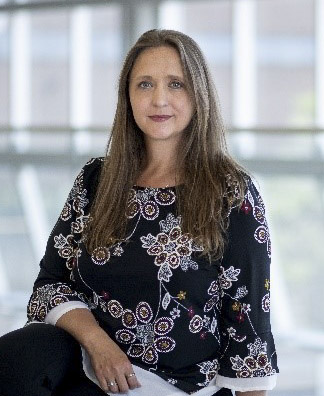Registrar, Accreditation Panel
Stewart Madon, Ph.D., C.Psych.
accreditation@cpa.ca
Tel: 613-237-2144 ext. 1333
Accreditation Coordinator
Ms. Christine McPherson
cmcpherson@cpa.ca
Tel: 613-237-2144 ext. 1334
The members of the CPA Accreditation Panel for 2024 – 2025 are:

Dr. Niki Fitzgerald completed her PhD in clinical psychology at the University of Windsor. She joined the Accreditation Panel in 2019 after serving as a site visitor. She is a clinical psychologist in the Work, Stress, and Health Program at the Centre for Addiction and Mental Health (CAMH) where she treats and assesses individuals injured at the workplace and assists clients reintegrate into the workforce. She supervises all levels of psychology trainees as well as psychiatry residents. She is the Director of Training for the CAMH residency program. She is a Lecturer in the Psychiatry Department at the University of Toronto, as well as Clinical Lecturer, in the Graduate Department of Psychological Clinical Science, University of Toronto, Scarborough. Since 2010 she has held Diplomat Status with the Academy of Cognitive Therapy. In 2016, Dr. Fitzgerald became a certified Road to Mental Readiness (R2MR) facilitator and was a clinician facilitator of this program for two local paramedic services. Outside of psychology, Dr. Fitzgerald is an avid runner and aspiring endurance triathlete.
Dr. Williams is the Canada Research Chair for Mental Health Disparities at the University of Ottawa in the School of Psychology. Her work focuses on ethnic minority mental health and psychopathology research. She completed her undergraduate studies at MIT and UCLA and received her doctoral degree from the University of Virginia. She completed her psychological internship at Montreal General Hospital. She was an Assistant Professor at the University of Pennsylvania for four years, followed by five years at the University of Louisville, where she served as Director of the Center for Mental Health Disparities. She also was at the University of Connecticut for three years, where she held joint appointments in Psychological Sciences and Psychiatry
Dr. Christina Rinaldi is a Professor in the College of Social Sciences & Humanities at the University of Alberta and the Scientific Director for the Canadian Center for Mentoring Research. Her particular expertise is in the area of developmental social and emotional psychological functioning and wellbeing, parenting, parent-child relationships, and early childhood school readiness. Her research interests include studying how critical relationships (family, mentors) support children and youth social and emotional learning, development, and overall wellbeing. A common thread across all of her research and career has been the drive to enhance youth development and wellbeing through social connection.
Sheila Garland completed her PhD in Clinical Psychology at the University of Calgary and her predoctoral residency at the Calgary Clinical Psychology Residency (CCRP) program. After that, she completed a three year CIHR funded post-doctoral fellowship at the University of Pennsylvania in Philadelphia before joining the faculty in the Department of Psychology at Memorial University. She is an associate professor and Director of Clinical Training for the Doctor of Psychology (PsyD) program. She is a registered psychologist in the province of Newfoundland and Labrador and has a vibrant externally-funded clinical research program in the areas of psychosocial oncology, behavioral sleep medicine, and digital health.
BIO AND PICTURE FORTHCOMING
Dr. Kaori Wada is an Associate Professor in Counselling Psychology at the University of Calgary, where she serves as the Director of Training for the CPA-accredited PhD program. She received her PhD in Counselling Psychology from McGill University. Her work is informed by feminist and post-colonial theories as well as critical psychology, with a broad focus on social justice and human rights. She has published on topics such as the medicalization of grief, psychologists’ role in medically assisted dying, gender-affirming counselling, decolonization and internationalization of psychology, and the experiences of newcomers (e.g., LGBTQ refugees, international students, skilled workers). Originally from Japan, she recently published a co-edited book in Japanese titled A Social Justice Approach to Psychotherapies (2024).
Dr. Elizabeth Church is Professor Emeritus at Mount Saint Vincent University (MSVU) in Halifax and a registered Psychologist in Nova Scotia. Previously, she was a faculty member in School Psychology (2003-2023), and Vice-President Academic and Provost (2010-2019) at MSVU and a faculty member at Memorial University of Newfoundland (MUN) 1987-2003. I Her experience encompasses both residency and program perspectives: she was Training Director of the CPA-accredited residency at MUN’s Counselling Centre and Program Coordinator of the School Psychology Program at MSVU.
In her research, she has focused on women in families and mental health in rural communities.
Dr Church has extensive experience in quality assurance, both as Provost where she oversaw the assessment and review of all programs within the University and as Chair of the Quality Assurance Committee of the Maritime Provinces Higher Education Commission (MPHEC). She has had a longstanding commitment to CPA, including two terms on the CPA Board, Chair of the CPA Working Group on Telepsychology, Chair of the CPA Education and Training Committee, and Coordinator of the Section on Women and Psychology. She was elected as a CPA Fellow in 2011.

As the Provincial Leader of Training and Education for the Nova Scotia Health (NSH) Mental Health and Addictions Program, Dr. Jacquie Cohen (she/her), RPsych, leads the clinical training of mental health clinicians throughout Mi’kma’ki. Prior to this role, she co-founded and co-led the Borderline Personality Disorder (BPD) Treatment Program at NSH then worked as an Advanced Practice Lead, implementing a stepped care model for BPD treatment throughout the province. Dr. Cohen is the past Certification Chair (2017-2021) and President (2022-2023) of CACBT. She co-authored CACBT’s National Guidelines for Training in CBT and is on the Training and Accreditation Committee of the World Confederation of Cognitive and Behavioural Therapies. She is also an Assistant Professor with the Department of Psychiatry at Dalhousie University. Dr. Cohen is the former Director of Training of the Halifax Clinical Psychology Residency Program, a past Board Member of the Canadian Council of Professional Psychology Programs, and the co-developer of APPIC’s Accreditation Readiness Project for Canadian Programs. She is certified in CBT by CACBT and in DBT by the DBT-Linehan Board of CertificationTM and is a DBT-PE provider.
Patrick Hickey is a PhD Clinical Psychology student at Dalhousie University. Patrick’s research interests focus on the impact of discrimination and protective factors (e.g., social support, community connectedness) on the mental health of 2SLGBTQIA+ individuals. Patrick completed an MA and BSc at the University of New Brunswick, focused on the access to health services for 2SLGBTQIA+ communities across North America.
Purpose:
|
The purpose of the Accreditation Panel for Doctoral and Residency Programs in Professional Psychology (referred hereinafter as “Panel”) is to uphold the standards of education and training in professional psychology (defined in the CPA’s Accreditation Standards) as it exercises judgment in making decisions about programmes that have applied or re-applied for accreditation. |
Goals:
|
Uphold the standards of education and training in professional psychology; and
Hold regular meetings during which accreditation and reaccreditation decisions are rendered. |
Webpage:
|
https://cpa.ca/accreditation/ |
Contact:
|
accreditation@cpa.ca |
Role of the Panel: The principal function of the Panel is to uphold the standards of education and training in professional psychology (defined in the Standards section of the Accreditation Manual) as it exercises judgment in making decisions about programmes that have applied or re-applied for accreditation. In addition, the Panel (with delegation to the Registrar):
- develops and disseminates the documents necessary to guide and assess programmes throughout the accreditation process
- coordinates and reviews annual reporting of programmes throughout the terms of their accreditation
- trains site visitors to participate in the accreditation process
- consults to its many publics (e.g., programmes, students, consumers) on matters related to accreditation
- consults to the Board, and any delegated governance, on matters related to accreditation
- undertakes any action, permitted by its Standards and Procedures, necessary to carrying out its functions as outlined above
Composition of the Panel: The Panel is comprised of 9 members, appointed by the CPA Board, for staggered 3-year terms that may be extended for up to 3 more years. One of the members is elected by the Panel as Chairperson, and one of the members is a doctoral student in clinical psychology, counselling psychology, school psychology, or clinical neuropsychology and is a student member of CPA. The student has completed at least 1 year of graduate study and will remain a student for the 3-year term on the Panel. The student member assumes the same roles and responsibilities of any Panel member, aside from acting as Chairperson. As a group, the Panel members represent the specialities (i.e., clinical psychology, counselling psychology, school psychology, and clinical neuropsychology), types (i.e., doctoral or internship), and geographic locations of the programmes accredited by the CPA. In addition, the Panel endeavours to have other dimensions of diversity represented among its members.
Become a CPA Accreditation Panel Member: Panel members conduct reviews of programme applications throughout the year, and the Panel formally meets twice yearly (Spring and Fall) in Ottawa, with all travel expenses covered by CPA. At these times of the year acting as a Panel reviewer requires a high level of commitment and involvement. However, Panel membership is also an extremely interesting and rewarding experience. As the number of accredited programmes in Canada grows, we continually have a need for new Panel members.
To apply to serve as a Panel member, the following requirements must be met:
- hold membership in CPA and other psychological associations
- are currently, or have recently been, a faculty/staff member, or affiliate in some official capacity, of a doctoral or internship programme
- are knowledgeable about professional and scientific issues in psychology
- hold licensure/certification, where appropriate
- are active in their academic/professional careers
- possess a doctoral degree and have completed a doctoral-level internship at accredited programmes or their equivalents
To nominate yourself or another person to serve as a member of the CPA Accreditation Panel, please submit a CV and letter of interest to the Registrar at accreditation@cpa.ca.









